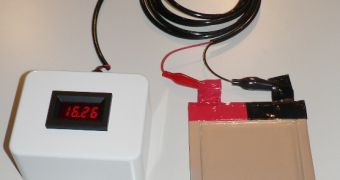Although nobody can deny the fact that today's gadgets evolve at neck breaking speeds developments in the battery field are few and far between, so Toyota's newly all-solid-state battery comes as great news to us, this type of battery technology usually delivering higher output power to all the devices that need it, such as electrical vehicles.
Built as a laminated cell measuring 10x10cm, this new battery developed by Toyota Motor Corp uses four sets of laminated positive electrode layers, solid electrolyte layers and negative electrode layers, the average voltage for a cell being 14.4V, since each set of layers develops 3.6V.
However, by exhibiting the battery right after it was charged, Toyota managed to deliver an impressive 16.26V from its prototype built out of lithium cobalt dioxide (LiCoO2), graphite and sulfide.
However impressive this may sound, solid-state batteries are not without their flaws, these type of power packs having a problem with a chemical reaction produced between the boundary surfaces of positive electrodes and solid electrolyte, that leads to increased resistance over time.
In order to solve this, Toyota had to reduce the resistance of the boundary surface by coating it with ceramics, thus preventing increased resistance.
Although this battery is still under development, all-solid-state batteries can deliver higher output power while also being safer than regular batteries since they can be used at a temperature of 100°C, according to Toyota.
This is by no means an easy feat to achieve, since exposing a regular lithium-ion rechargeable battery to that type of temperatures would quickly cause it to fail, the heat causing the electrolytes inside to boil.
Unfortunately, Toyota wasn't able to provide us with a time-table regarding when will these new type of all-solid-state batteries will enter mass production or when should we expect development to reach an end, since this technology is still in its early stages. (via Tech-On)

 14 DAY TRIAL //
14 DAY TRIAL //